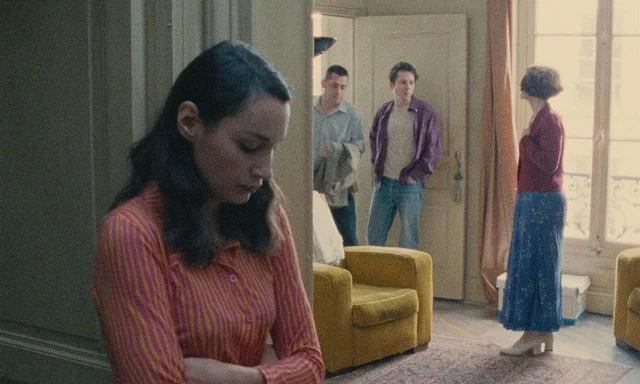 |
| Connie Nielsen in Demonlover |
Cast: Connie Nielsen, Charles Berling, Chloë Sevigny, Dominique Reymond, Jean-Baptiste Malartre, Gina Gershon, Edwin Gerard, Thomas M. Pollard, Abi Sakamoto, Naoko Yamazake, Nao Omori. Screenplay: Olivier Assayas. Cinematography: Denis Lenoir. Production design: François-Renaud Labarthe. Film editing: Luc Barnier. Music: Jim O'Rourke, Sonic Youth.
Demonlover is a kind of message movie, and we all know the Hollywood truism about those: "If you want to send a message, call Western Union." But Olivier Assayas is not a Hollywood director, and his message comes through loud and clear. It's a familiar one: In the hands of globalized corporate capitalism, the internet has the potential to become a corrupting and alienating force. The film opens with a bunch of corporate capitalists luxuriating in business class on a flight to Japan to negotiate the rights to pornographic anime produced by a studio there. On the flight, Diane (Connie Nielsen) slips a drug into the Evian water being drunk by her superior at the Volf Corporation, Karen (Dominique Reymond), who collapses when they land in Tokyo. Diane then takes her place in the negotiations. It soon becomes clear that Diane will stop at nothing to seal a deal, but also that she's a double agent working for Volf's competitor, Mangatronics. Once Diane and her partner, Hervé (Charles Berling), land the rights, they begin negotiations with Demonlover, an internet company represented by Elaine Si Gibril (Gina Gershon), which also runs a site called The Hellfire Club on the dark web that specializes in torture porn and perhaps even snuff films. Diane's aim is to acquire Demonlover for Mangatronics instead of Volf, and she'll stop at nothing to do so. Unfortunately for Diane, her assistant, Elise (Chloë Sevigny), is also a corporate spy, and the spy vs. spy plot takes a bloody turn. Assayas isn't content to tell this story in conventional thriller fashion, so what we get involves a lot of disorienting camerawork and editing, and the movie makes its point with a somewhat disjointed ending. It was a critical and commercial flop, but the awareness that its message was prophetic has caused it to be reevaluated.



















